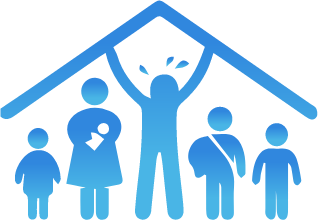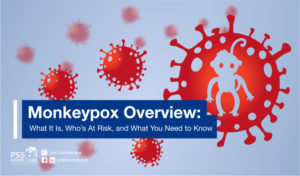Assisted Living Communities and In-Home Care: At the Crossroads of...
Read MoreCoping with Covid-19:
Managing Stress, Anxiety Amid A Global Pandemic

The Covid-19 pandemic has impacted the lives of people around the world on a massive scale. Aside from the different physical challenges this public health crisis brings to confirmed cases and their loved ones, it also brings about high levels of stress and anxiety. In fact, according to the Annual Stress in America survey conducted by the Harris Poll, U.S. adults reported having Covid-19 stress levels at 5.9, which is significantly higher than the 4.9 level they reported in 2019.
Why are pandemics like Covid-19 so stressful?
There are many reasons why pandemics or disease outbreaks can cause people to deeply worry and be anxious:

A new disease that we are only just learning about can trigger fear

In the case of Covid-19, there’s still no vaccine that can keep us protected

We are suddenly in the middle of new and unfamiliar situations, such as lockdowns, social isolation, and even job losses
A pandemic can bring about great levels of stress and anxiety in people, and it’s critical to understand what these terms mean, what they look like, and how to address them to keep ourselves and our families as healthy and safe as possible.
What do “stress” and “anxiety” mean?
Stress is a kind of strain that we feel physically, mentally, or emotionally. It has different types.

Acute Stress
This is when a person feels stressed because of being involved in uncontrollable or threatening situations or events such as getting involved in a car crash. This causes the fight-or-flight mode to kick in.

Chronic stress
This type of stress is associated with day-to-day life such as paying bills and taking care of your family.

Eustress
Also called “positive stress,” this type brings about mild or moderate stress levels that most of the time drives motivation and excitement in people. Examples of events that bring eustress are getting married or getting promoted at work.

Distress
Is felt when one’s resources and capacities cannot match the demands of daily life, such as going through a divorce or running into financial problems, which can lead to feelings of being overwhelmed. Unlike in eustress, this type of stress can demotivate people and lead them to feel anxious or depressed.
Meanwhile, anxiety refers to a person’s response to an unknown or a vague threat, believing that such an event may take place or is expected to take place.
The signs of stress
Stress can manifest itself physically, cognitively, behaviorally, and emotionally.
Physical manifestations of stress
- Tension headaches and migraines
- Achey, painful, and taut muscles
- Skin breakouts and irritations
- Hair loss
- Low energy levels
- Fatigue
- Upset stomach
- Palpitations
- Dry mouth, clenched jaw, and grinding teeth
- Nervousness and breathlessness
- Cold, shaking, and sweaty hands and feet
Cognitive symptoms of stress
- Ceaseless worrying or being unable to switch off
- Impaired judgment
- Forgetfulness
- Disorganization
- Inability to focus on tasks
- Indecisiveness
- Being negative or pessimistic
- Having constant nightmares
Behavioral signs of stress
- Changes in sleeping patterns (sleeping too long or not sleeping long enough)
- Changes in appetite (eating too much or not eating enough)
- Increased use or dependence on cigarettes, alcoholic beverages, or even drugs
- Procrastinating
- Constantly nail-biting, fidgeting, or pacing
Emotional signs of stress
- Easily agitated or frustrated
- Withdrawal or isolation
- Having more mood swings
- Inability to relax
- Feeling hopeless
- Feeling overwhelmed
- Being short-tempered and impatient
How should we handle stress and anxiety amid the Covid-19 pandemic?
The reality of it is that we’re living in uncertain and scary times. Covid-19 has impacted our lives in unprecedented ways — cities and countries have closed off, jobs and businesses were lost, lockdown measures have been in effect, and our healthcare facilities are overwhelmed. Gone are the days, at least for the time being, where we can watch concerts or go on vacations. We are now asked to stay indoors unless it’s absolutely necessary for us to go outside.
All of a sudden, our lives have drastically changed and we are uncertain as to how long these changes will be in effect for — and what the future holds.
Here are ways that will help us handle the stress and anxiety that are brought about by the Covid-19 pandemic:
1. Stay up-to-date with vital information
It’s important to know what’s happening in our communities and around the world pertaining to the pandemic. When we don’t have enough information or if we are exposed to false information, it will worsen the stress and anxiety that we’re already feeling. So make sure that you read and watch credible sources. If you feel that a certain news item about the pandemic is too good to be true or is too sensationalized, it would be best to check reputable sources before believing it and sharing it with your friends and loved ones on social media.
It’s also important to note that over-consumption of pandemic-related news can also cause stress and anxiety, and it’s important to take breaks when you feel overwhelmed with the news.
2. Exercise regularly
A recent study has shown that 1 out of 4 people have had no exercise or even light physical activity in the past 7 days during the Covid-19 pandemic. Because we’re all staying at home more, we should make a more conscious effort to exercise. Aside from the many health benefits of exercising such as boosting our immune system to help fight off illnesses better, exercising also releases endorphins, which help us reduce stress by elevating our mood. Hit two birds with one stone and walk outside, if possible in your area, so that you can get fresh air and sunshine in your system while you exercise.
3. Be prepared
There may be a lot of things that we cannot control during a pandemic, but we should focus on the things that we can control — such as by being prepared. You may not be able to stop the spread of Covid-19 or how other people are behaving, but you can take steps to ensure that you and your loved ones remain safe such as properly washing your hands, wearing a face mask, practicing physical distancing, and avoiding crowds and large gatherings.
4. Stick to a schedule
Adding more structure to how you live your daily life can help you sleep, work, and eat better. It’s important to include exercising in your schedule. Pencil it in before you start work, during your lunch break, or after your shift. Doing so will also promote a better work-life balance and a sense of normalcy especially during these challenging times. Sticking to a schedule will help improve your overall mental health and give you ample time to de-stress and relax daily.
5. Be kinder to yourself
Just because we’re living in uncertain times, it doesn’t mean that you should stop doing things that you enjoy. Take the time to read, listen to music, play a board game, do a puzzle, or bake pastries with your loved ones. Practicing mindfulness and meditation can also help keep stress at bay. For a few minutes, sit quietly in one corner, close your eyes, and focus on your senses; focus on being present and being aware.
You should also understand that it’s okay and it’s normal to feel even more stressed out or less productive during these times. When you’re feeling down, talk to someone you trust about how you’re feeling.
Check out our other articles
A Woman’s Guide to Life After Menopause
A Woman’s Guide to Life After Menopause Menopause, which occurs...
Read MoreMonkeypox Overview: What It Is, Who’s At Risk, and What You Need to Know
Monkeypox Overview:What It Is, Who’s At Risk, and What You...
Read MoreLiving and Caring: Improving Patient and Caregiver Quality of Life with Respite Care
Living and Caring: Improving Patient and Caregiver Quality of Life...
Read More



